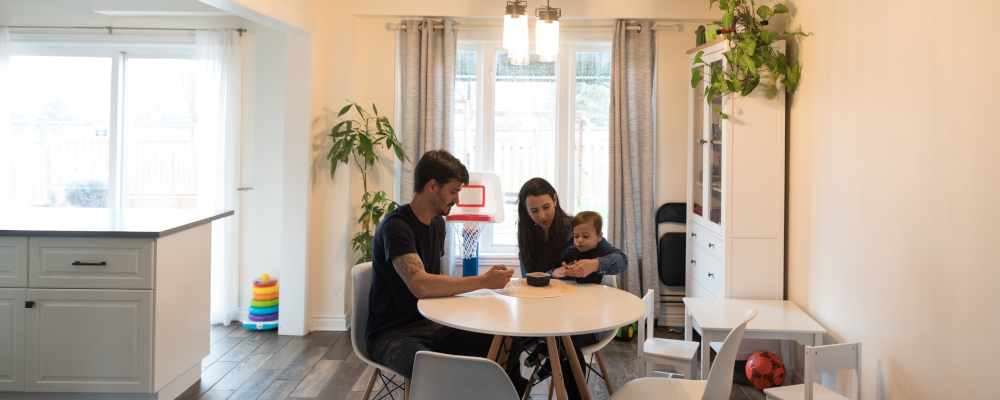Eric Lombardi’s recent essay for The Hub on how Canada’s housing crisis risks transforming the country into a neofeudal society certainly touched a nerve. It reflects a growing (and compelling) view that one might describe as “the housing theory of everything” in which high housing prices have come to hold explanatory powers over various economic, social, and even psychological trends in modern Canada.
His basic thesis—the inability of many young Canadians to enter the housing market without familial financial support is creating a new source of social bifurcation—is straightforward and supported by evidence. Recent polls in British Columbia and Ontario for instance have found that 40 percent of first-time homebuyers in the two provinces have depended on financial support from their families.
These figures are consistent with new Statistics Canada research that shows that the homeownership rate for millennials and members of Generation Z whose parents themselves are homeowners is more than double those whose parents are not. Housing wealth, in other words, has increasingly come to beget more housing wealth.

The bigger point—housing-based inequality is an interpretive lens for understanding broader trends including the public’s general sense of malaise—is one that the Trudeau government has quite possibly come to understand too late for its own political survival and one that Canadian policymakers more generally have failed to understand to the detriment of current and future generations.
One of the indirect yet powerful ways in which these housing affordability challenges have manifested themselves is in the form of delayed family formation and declining fertility rates. The interrelationship between housing prices and family planning is somewhat intuitive. Housing costs—particularly in high-cost localities—are a major household expenditure and therefore necessarily influence our short- and long-term expectations including when to start a family and how many children that families ultimately ought to have.
A well-regarded 2014 economics article put it this way:
Rising home values have a negative impact on birth rates because they represent, on average, the largest component of the cost of raising a child: larger than food, childcare, or education. This implies that when the price of housing rises, the price of having children also rises. This price increase leads couples to delay childbearing or to have fewer children altogether.
This interplay between housing and family formation is having perverse effects in Canada. Unlike most peer jurisdictions, babies in Canada have become, in the words of demographer Lyman Stone, a “luxury good.” His research finds that higher-income Canadian families tend to have both higher desired and actual fertility rates. As he put it in a 2023 episode of Hub Dialogues: “Canada’s a place where fertility is uniquely, positively correlated with income, which is nerd speak for Canada’s a place where family is a sign of wealth and social class. If you’re rich, you can buy the right to have kids.”
Housing is a big part of this story—especially as it has become a leading indicator of income and wealth in Canadian society. Previous analysis for The Hub by Steve Lafleur for instance has shown that a household must now be among the top 10 percent of household income to even qualify for a mortgage in the City of Toronto. Similarly, research by TD Economics has found that wealth inequality in Canada is, by and large, a function of the differing outcomes between homeowners and non-homeowners, including both intra- and inter-generationally.
It’s not a complete coincidence therefore that Lombardi’s essay was published the same week as new data from Statistics Canada that the country’s fertility rate hit an all-time low in 2022. At 1.33 children per woman, the country is not only 0.6 percentage points below the replacement rate, but its year-over-year drop was among the largest in high-income countries and Canada’s own history. The same analysis found that the average age of first-time mothers has increased from 27.6 years in 1976 to 31.6 years in 2022.
Although these developments are undoubtedly multicausal, it’s notable that Canadian women tell consistently pollsters that there’s a gap between their desired and actual fertility rates. They’d actually prefer to have a number of children approximating the replacement rate, but there are different impediments standing in their way including high housing costs.

As Stone has previously written:
If young people are stuck in smaller houses than in the past, or in more unstable or expensive housing situations, it could reduce fertility…There is some good suggestive evidence that this may be happening… at every stage, the housing situation for young people disfavours childbearing more than in the past, which is almost certainly a major driver of low fertility today.
Even if one accepts that Lombardi’s claims about neofeudalism may seem a bit provocative, his characterization of Canada’s socioeconomic context in which homeownership and child-rearing are increasingly expressions of (hereditary) wealth clearly resonates with a lot of young people (including members of The Hub’s staff) who are seeing both become the purview of their wealthier and more advantaged peers.
Setting aside the economic and social costs of high housing prices and their effects on fertility rates for a minute, there’s something conceptually incompatible with the egalitarian promise of Canadian society for the “haves” to be able to own homes and have children and the “have nots” to have neither. These basic milestones of what has traditionally been understood as the “good life” shouldn’t be treated as luxury goods. A society in which they are—in which the aspirations to own a home or become a parent are understood as signs of wealth or social class—can persuasively be defined as neofeudal.
As for the costs themselves, they can never be fully measurable. A full accounting of the opportunity costs of the births and lives that never come into being or the social costs of growing stratification will ultimately be greater than we can ever understand.
Recommended for You

Kanye West’s insufficient apology and the return of gold stars: Roundup

‘This is not a Jewish problem, it’s a Canada problem’: Holocaust remembrance demands action, not slogans

‘The mainstream media forfeited so much trust’: Former New York Times editor on how activism kills journalism

Half of childless Canadian women don’t want kids, nearly a quarter in their 40s aren’t mothers: Statistics Canada




